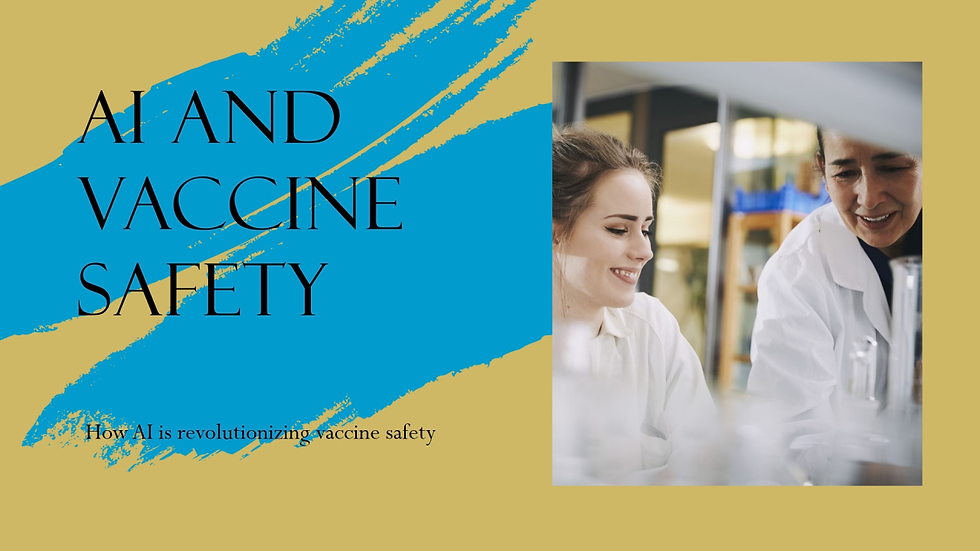
Predictive modeling supported by Artificial Intelligence (AI) is revolutionizing vaccine safety by enhancing the ability to forecast adverse events following immunization (AEFI) and improving public health outcomes. This blog explores the role of AI in predictive modeling for vaccine safety, its applications, benefits, challenges, and future implications.
Introduction to AI in Predictive Modeling for Vaccine Safety:
Artificial Intelligence (AI) is increasingly employed in healthcare to analyze large datasets and make predictions based on patterns and correlations. In the context of vaccine safety, AI-driven predictive modeling enables proactive monitoring of adverse events, enhances decision-making, and contributes to the continuous improvement of vaccination programs.
Importance of Predictive Modeling in Vaccine Safety:
1. Early Detection of Adverse Events
Timely Intervention: Predictive modeling identifies potential adverse events early, allowing healthcare providers and regulators to implement mitigation strategies promptly.
Risk Assessment: Enables continuous monitoring and assessment of vaccine safety profiles to inform public health policies and regulatory decisions.
2. Enhanced Vaccine Development and Deployment
Optimized Vaccination Strategies: Predictive models guide the development and deployment of vaccines by forecasting safety profiles and efficacy outcomes.
Resource Allocation: Facilitates efficient allocation of healthcare resources based on predicted vaccine safety risks and population demographics.
3. Improved Public Health Surveillance
Real-time Monitoring: AI-driven predictive models enable real-time surveillance of vaccine safety data, enhancing the capacity to respond to emerging health threats.
Data-driven Insights: Provides evidence-based insights into vaccine effectiveness and safety across diverse populations.
Applications of AI in Predictive Modeling for Vaccine Safety:
1. Risk Prediction and Assessment
Machine Learning Algorithms: AI algorithms analyze historical vaccine safety data to identify risk factors and predict adverse events.
Statistical Models: Utilize predictive analytics to assess the likelihood and severity of adverse reactions based on demographic, clinical, and vaccine-related variables.
2. Pattern Recognition and Signal Detection
Anomaly Detection: AI identifies unusual patterns or deviations in vaccine safety data that may indicate potential safety concerns.
Signal Prioritization: Automates the prioritization of adverse event signals for further investigation and regulatory action.
3. Personalized Medicine and Vaccine Development
Genomic Analysis: Incorporate genomic data to personalize vaccine safety assessments and predict individual responses to vaccination.
Precision Medicine: AI supports the development of tailored vaccines by predicting safety profiles and efficacy outcomes based on genetic and immunological factors.
Benefits of AI in Predictive Modeling for Vaccine Safety:
1. Enhanced Accuracy and Efficiency
Data-driven Decision-making: AI improves the accuracy of predicting adverse events and vaccine safety outcomes, minimizing false positives and negatives.
Resource Optimization: Efficiently allocate resources for monitoring and managing vaccine safety based on predictive insights.
2. Early Warning Systems
Proactive Surveillance: AI-driven early warning systems alert healthcare providers and regulators to potential safety signals before widespread adverse events occur.
Rapid Response: Facilitates rapid response and intervention strategies to mitigate risks and ensure patient safety.
3. Continuous Improvement
Iterative Learning: AI models continuously learn and adapt based on new data inputs, improving predictive accuracy and reliability over time.
Feedback Mechanisms: Incorporate feedback from healthcare professionals and regulatory agencies to refine predictive models and enhance their applicability.
Challenges in Implementing AI for Predictive Modeling in Vaccine Safety:
1. Data Quality and Accessibility
Data Integration: Integrate diverse datasets from healthcare systems, clinical trials, and public health agencies to ensure comprehensive analysis.
Data Standardization: Address inconsistencies in data quality, formats, and accessibility across different sources and jurisdictions.
2. Ethical and Regulatory Considerations
Privacy Protection: Safeguard patient confidentiality and comply with data privacy regulations (e.g., GDPR, HIPAA) when handling sensitive health information.
Transparency: Ensure transparency in AI algorithms and decision-making processes to build trust among stakeholders.
3. Technological Infrastructure and Expertise
Resource Allocation: Invest in robust IT infrastructure and AI capabilities to support predictive modeling and real-time data analysis.
Skill Development: Develop healthcare professionals' expertise in AI applications and data science to effectively utilize predictive models in vaccine safety monitoring.
Future Directions and Innovations:
1. Advancements in AI Technologies
Deep Learning: Explore deep learning techniques to enhance AI capabilities in analyzing complex vaccine safety data.
Natural Language Processing (NLP): Use NLP to extract and analyze unstructured data from medical records and social media for enhanced surveillance.
2. Global Collaboration and Data Sharing
International Standards: Establish global standards and protocols for AI-driven predictive modeling in vaccine safety to facilitate data sharing and collaboration.
Cross-border Research: Foster international partnerships for sharing vaccine safety data and insights to address global health challenges.
3. Ethical AI Governance
Ethical Guidelines: Develop and implement ethical frameworks for AI applications in vaccine safety, ensuring responsible use and equitable access to predictive modeling technologies.
Public Engagement: Engage stakeholders in discussions about AI in healthcare to address concerns, promote transparency, and build public trust.
Case Studies and Success Stories:
1. COVID-19 Vaccine Development
Predictive Modeling: AI-supported predictive modeling contributed to the rapid development and evaluation of COVID-19 vaccines, ensuring safety and efficacy.
Global Impact: Facilitated global vaccine deployment strategies based on predictive insights into vaccine safety profiles and adverse event risks.
2. Influenza Vaccine Surveillance
Long-term Monitoring: AI-driven predictive models continuously monitor influenza vaccine safety data to assess effectiveness and detect emerging safety signals.
Enhanced Preparedness: Strengthened public health response capabilities during seasonal influenza outbreaks through proactive surveillance and intervention.
Conclusion:
AI-driven predictive modeling holds immense potential to transform vaccine safety by enhancing early detection of adverse events, optimizing vaccination strategies, and improving public health surveillance. By addressing challenges in data quality, ethical considerations, and technological infrastructure, healthcare systems can harness the power of AI to strengthen vaccine safety monitoring and ensure the ongoing effectiveness and safety of vaccination programs worldwide. As AI technologies evolve, continued innovation and collaboration will be essential to realize the full benefits of predictive modeling in safeguarding global health against vaccine-preventable diseases.

Comments